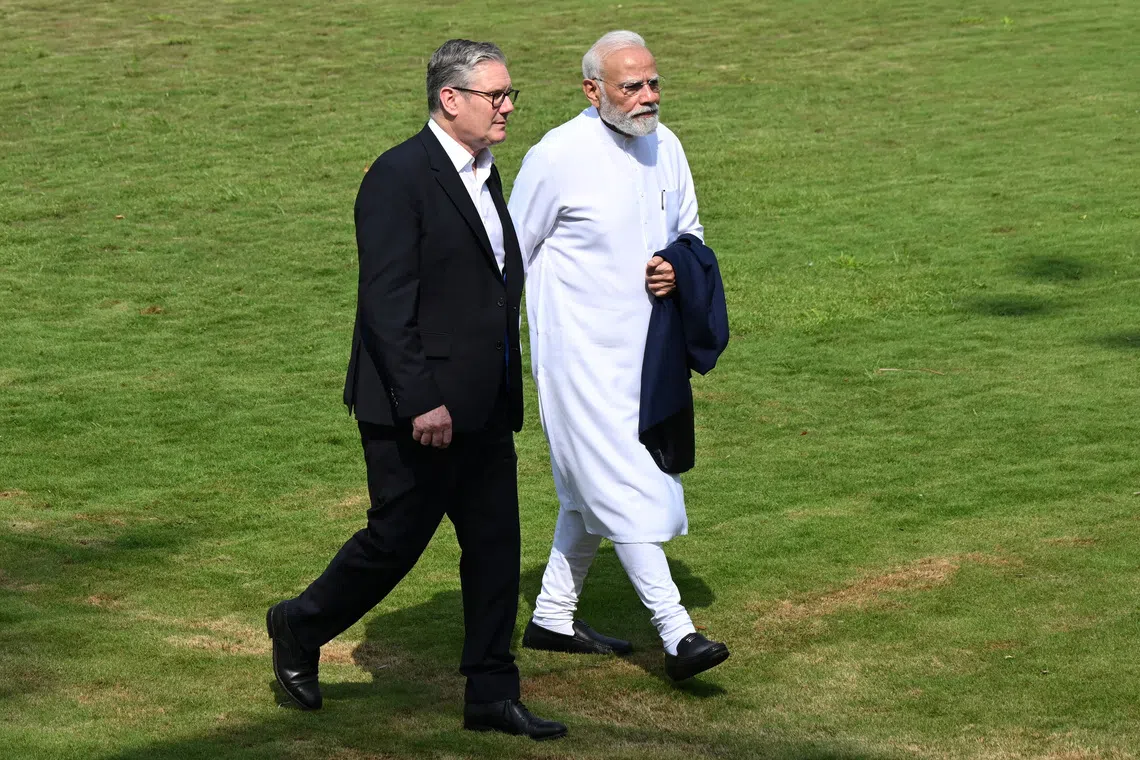India’s Modi, Britain’s Starmer push for benefits from trade deal to add jobs
Sign up now: Get insights on Asia's fast-moving developments

The deal agreed to cut tariffs on goods from textiles to whisky and cars.
PHOTO: REUTERS
Follow topic:
MUMBAI – Indian Prime Minister Narendra Modi and British counterpart Keir Starmer hailed the potential on Oct 9 of their months-old trade deal to transform commercial links, as London unveiled further Indian investment in Britain.
Mr Starmer is in the financial capital of Mumbai on a two-day visit to India, joined by more than a hundred leaders from the business, culture and university sectors, as he rushes to harvest the trade deal signed in July.
The deal agreed to cut tariffs on goods from textiles to whisky and cars, and allow more market access for businesses in the world’s fifth- and sixth-largest economies, aiming to boost two-way trade by a further £25.5 billion (S$44.2 billion) by 2040.
Modi hails Indian dynamism, British expertise
Mr Starmer’s visit, accompanied by the largest-ever business delegation, “reflects the new energy and broad vision” in the partnership, Mr Modi said after talks with the British Prime Minister.
“India’s dynamism and Britain’s expertise together create a unique synergy,” Mr Modi said, speaking in Hindi.
“Our partnership is built on trust... it is a clear reaffirmation of our shared commitment to... build a brighter future for the people of both our nations.”
Mr Starmer said the focus of his visit was about doubling down on the potential of the trade deal, expected to take effect within a year.
“When we leave India tonight, I expect that we will have secured major new investments creating thousands of high-skilled jobs in the sectors of the future.”
An Indian Foreign Ministry statement said the two sides agreed to set up an India-Britain connectivity and innovation centre and a joint centre for AI, and unveiled a critical minerals industry guild to bolster supply chains and promote green technologies.
They also announced joint investment in a climate technology start-up fund and set up new collaborations on health and renewable energy, an offshore wind task force, and a health research partnership, among other things, it said.
India, Britain sign defence deals
Earlier, Mr Starmer’s office said 64 Indian companies would collectively invest £1.3 billion in Britain, without elaborating.
But the two countries do not agree on everything.
After Mr Modi wished Russian President Vladimir Putin a happy birthday on Oct 7, Mr Starmer joked to reporters that he would not be doing the same, given Britain’s strong backing for Ukraine and condemnation of Russia over its invasion.
Britain says it respects India’s strategic independence and Scottish Secretary Douglas Alexander, a former trade minister who joined the delegation, told reporters the issue had not prevented Mr Starmer from leveraging close ties with Mr Modi to grow the British economy.
In an early indication of that strategy, Britain said it had signed a £350 million contract to supply the Indian army with lightweight multi-role missiles built in Northern Ireland, and the next phase of a deal, worth an initial £250 million, to collaborate on electric-powered engines for naval ships.
Separately, Mr Modi said flying instructors from the Indian Air Force would serve as trainers with the Royal Air Force, as part of their agreement for cooperation in military training.
New Delhi has for decades been dependent on Moscow for much of its military hardware but has slowly moved away in recent decades to buy from France, Israel and the US.
Britain said two British universities had been given approval to open new campuses in India, which it said would help Britain expand its influence “without adding pressure to domestic migration figures”, as the government tightens rules around international students and has said more Indian visas were not on the agenda for talks. REUTERS

